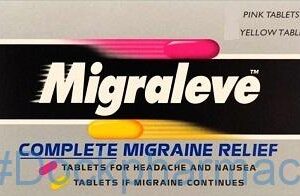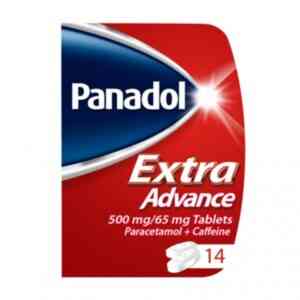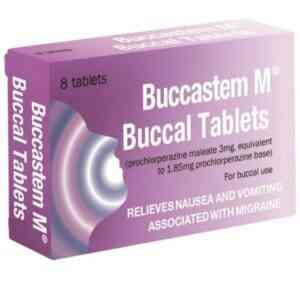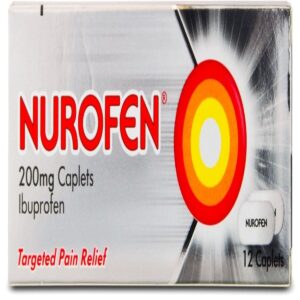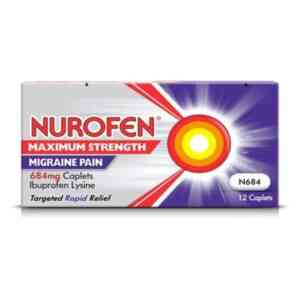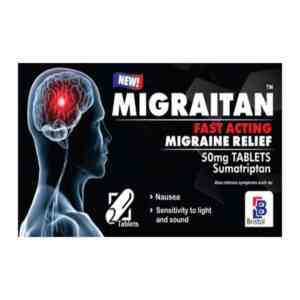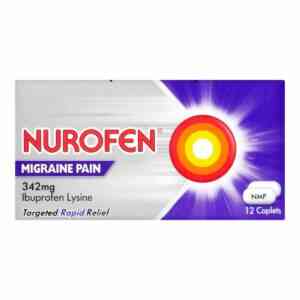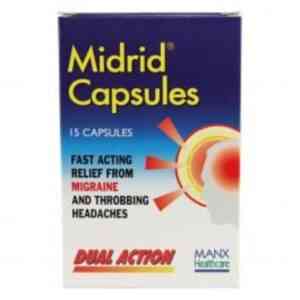Prochlorperazine 3mg Buccal Tablets, 8 Tablets
- Reduce the symptoms of nausea
- Effective at the first sign of migraine attack
- Dissolves in mouth
- Can be combined with a painkiller
- Suitable for Adults over 18 years
- Treat vomiting and nausea related with migraines.
- Contains prochlorperazine maleate
- Effective when taken at first sign of migraine attack
Original price was: £6.50.£5.99Current price is: £5.99.
CompareCompare- Treat vomiting and nausea related with migraines.
- Contains prochlorperazine maleate
- Effective when taken at first sign of migraine attack
Prochlorperazine 3mg Buccal Tablets, 8 Tablets
Do you suffer from migraines, vertigo, or inner ear problems? Do you dread taking medicine because you can’t stand swallowing pills? Well, there’s good news! Prochlorperazine 3mg buccal tablets dissolve in your mouth, so you don’t have to worry about that anymore.
Prochlorperazine is an anti-nausea medication that works by blocking the activity of dopamine receptors in the area of the brain that initiates nausea. So if you’re suffering from any condition that causes nausea, prochlorperazine buccal tablets are a great option. They’re easy to take and they work quickly to relieve your symptoms. Give them a try the next time you need an anti-nausea medication.
Prochlorperazine 3mg buccal tablets dissolve in the mouth, so are popular among patients who cannot, or prefer not to swallow medicine.
Prochlorperazine Tablets are effective in treating nausea (feeling sick) and vomiting (being sick) from whatever cause. They are also used to treat migraines and dizziness due to ear problems and other causes.
Prochlorperazine Tablets contain prochlorperazine maleate 3mg. Prochlorperazine belongs to a large group of drugs known as phenothiazines, which have a variety of effects.
Prochlorperazine 3 mg Buccal Tablets can be used at the first sign of a migraine attack to help reduce the symptoms of nausea whilst your pain killer takes effect. Once placed on the gum the Buccastem M tablet dissolves slowly, letting the medication enter your blood stream providing long-lasting relief from nausea and vomiting for up to 12 hours
What is Migraine?
A migraine is usually a moderate or severe headache felt as a throbbing pain on 1 side of the head.
Many people also have symptoms such as feeling sick, being sick and increased sensitivity to light or sound.
Migraine is a common health condition, affecting around 1 in every 5 women and around 1 in every 15 men. They usually begin in early adulthood.
There are several types of migraine, including:
- migraine with aura – where there are specific warning signs just before the migraine begins, such as seeing flashing lights
- migraine without aura – the most common type, where the migraine happens without the specific warning signs
- migraine aura without headache, also known as silent migraine – where an aura or other migraine symptoms are experienced, but a headache does not develop
Some people have migraines frequently, up to several times a week. Other people only have a migraine occasionally.
It’s possible for years to pass between migraine attacks.
WHEN TO GET MEDICAL ADVICE
You should see a GP if you have frequent or severe migraine symptoms.
Simple painkillers, such as paracetamol or ibuprofen, can be effective for migraine.
Try not to use the maximum dosage of painkillers on a regular or frequent basis as this could make it harder to treat headaches over time.
You should also make an appointment to see a GP if you have frequent migraines (on more than 5 days a month), even if they can be controlled with medicines, as you may benefit from preventative treatment.
You should call 999 for an ambulance immediately if you or someone you’re with experiences:
- paralysis or weakness in 1 or both arms or 1 side of the face
- slurred or garbled speech
- a sudden agonising headache resulting in a severe pain unlike anything experienced before
- headache along with a high temperature (fever), stiff neck, mental confusion, seizures, double vision and a rash
These symptoms may be a sign of a more serious condition, such as a stroke or meningitis, and should be assessed by a doctor as soon as possible.
The exact cause of migraines is unknown, although they’re thought to be the result of temporary changes in the chemicals, nerves and blood vessels in the brain.
Around half of all people who experience migraines also have a close relative with the condition, suggesting that genes may play a role.
Some people find migraine attacks are associated with certain triggers, which can include:
- starting their period
- stress
- tiredness
- certain foods or drinks
There’s no cure for migraines, but a number of treatments are available to help reduce the symptoms.
These include:
- painkillers – including over-the-counter medicines like paracetamol and ibuprofen
- triptans – medicines that can help reverse the changes in the brain that may cause migraines
- anti-emetics – medicines often used to help relieve people’s feeling of sickness (nausea) or being sick
During an attack, many people find that sleeping or lying in a darkened room can also help.
If you suspect a specific trigger is causing your migraines, such as stress or a certain type of food, avoiding this trigger may help reduce your risk of experiencing migraines.
It may also help to maintain a generally healthy lifestyle, including regular exercise, sleep and meals, as well as ensuring you stay well hydrated and limiting your intake of caffeine and alcohol.
If your migraines are severe or you have tried avoiding possible triggers and are still experiencing symptoms, a GP may prescribe medicines to help prevent further attacks.
Medicines used to prevent migraines include the anti-seizure medicine topiramate and a medicine called propranolol that’s usually used to treat high blood pressure.
It may take several weeks before your migraine symptoms begin to improve.
OUTLOOK
Migraines can severely affect your quality of life and stop you carrying out your normal daily activities.
Some people find they need to stay in bed for days at a time.
But a number of effective treatments are available to reduce the symptoms and prevent further attacks.
Migraine attacks can sometimes get worse over time, but they tend to gradually improve over many years for most people
Prochlorperazine 3 mg Buccal Tablets Reviews
After using Prochlorperazine 3 mg Buccal Tablets, it’s helpful to let others know about your experience. Reviews of an item help other users know that medicines received have helped the condition it is claimed for, how well the treatment worked or any issues to be aware of. We invite our users to leave a review of both their treatment and of the service provided. Click on the reviews tab to see if there has been feedback on this item.
What is the price of Prochlorperazine 3 mg Buccal Tablets?
The price of Prochlorperazine 3 mg Buccal Tablets is £4.99
Where can you buy Prochlorperazine 3 mg Buccal Tablets?
You can buy Prochlorperazine 3 mg Buccal Tablets at Dock Pharmacy Essex UK, UK Online Pharmacy.
Can you buy Prochlorperazine 3 mg Buccal Tablets Over the counter?
Prochlorperazine 3 mg Buccal Tablets is available to buy over the counter. You do not need a prescription to buy Prochlorperazine 3 mg Buccal Tablets but you might be asked some questions about your medical health when you add it to your basket.
Brand
Buccastem
How to use
Prochlorperazine buccal tablets are placed in between the top gum and the upper lip. Leave the tablet in place, and allow it to dissolve. This will take one to two hours. As it dissolves, the ingredients are absorbed into the bloodstream. More of the medicine will be absorbed if it remains in one place, so refrain from moving it around with your tongue.
If you wear dentures, find any comfortable position for the tablet in between your lip and gum.
Take one or two prochlorperazine tablets, twice a day. Do not exceed this amount. If you have forgotten to take a tablet, you can take it once you remember to do so. However, if it is almost time for your next scheduled dose, skip the missed tablet. Do not double your dose to compensate for the one that you have missed.
Do not swallow buccal tablets, and refrain from eating until the tablet has completely dissolved.
Side Effects
Not everyone will experience side effects when they take prochlorperazine buccal tablets, however, if you do they can include:
Fatigue, dizziness, insomnia, dry mouth, skin irritations, low blood pressure, fainting, increased sensitivity to sunlight, increased blood sugar level, jaundice, impotence and other erectile problems, muscle tremors, abnormal movements of the tongue or face, irritated gums
Ingredients
The active ingredient contained in Prochlorperazine buccal tablets is Prochlorperazine maleate.
Warning
Prochlorperazine Buccal tablets are unsuitable for you if:
- You may be allergic to prochlorperazine maleate or any of the tablets’ inactive ingredients
- You have problems with the blood, liver or prostate gland
- You suffer from glaucoma, epilepsy, or Parkinson’s disease.
Before taking prochlorperazine tablets, consult your doctor if:
- You are at high risk for a blood clot or stroke (including high blood pressure, diabetes, high cholesterol or family history)
- You are breastfeeding, pregnant, or may become pregnant
- You have a muscle disorder such as myasthenia gravis
- You have HIV or AIDS.
You should also tell your doctor if you are taking any of the following types of medication:
- Sedatives (such as temazepam or diazepam)
- Medicines for high blood pressure (such as amitriptyline or imipramine)
- Epilepsy medication (such as carbamazepine or lamotrigine)
- Lithium
- Desferrioxamine
- Anticholinergic medicines (such as amitriptyline or imipramine).
Questions and answers of the customers
There are no questions yet, be the first to ask something for this product.
Other Products From This Seller
Original price was: £34.99.£24.95Current price is: £24.95.
Wahl Extreme Grip Beard Trimmer Precision Grooming with Comfort Grip and Adjustable Cutting Lengths Take Control of Your Grooming with the Wahl Extreme Grip Beard Trimmer Transform your grooming routine with the Wahl Extreme Grip Beard Trimmer, designed for precision, comfort, and versatility. Whether you’re sculpting a sharp beard line, maintaining stubble, or styling longer […]
Learn MoreOriginal price was: £34.99.£24.95Current price is: £24.95.
- Availability: in stock
Original price was: £23.99.£17.95Current price is: £17.95.
WAHL Vogue Corded Hair Clipper for Men Professional Precision with Adjustable Taper Lever and High-Carbon Steel Blades Transform Your Grooming Routine with the WAHL Vogue Corded Hair Clipper for Men Elevate your grooming experience with the WAHL Vogue Corded Hair Clipper, a professional-grade grooming tool designed for men who value precision and performance. Whether you’re […]
Learn MoreOriginal price was: £23.99.£17.95Current price is: £17.95.
- Availability: in stock
Original price was: £30.00.£8.95Current price is: £8.95.
Wahl Peaky Blinders Beard Trimmer Gift Set Limited Edition Cordless Grooming Kit for Men Join the ranks of the Peaky Blinders with the Wahl Peaky Blinders Beard Trimmer Gift Set. This exclusive collaboration between Wahl and the iconic TV series offers a comprehensive grooming solution for the modern gentleman. Key Features: Rechargeable Cordless Trimmer: Equipped […]
Learn MoreOriginal price was: £30.00.£8.95Current price is: £8.95.
- Availability: in stock
Original price was: £54.63.£39.95Current price is: £39.95.
OMRON RS2 Wrist Blood Pressure Monitor Compact and Accurate BP Monitoring The OMRON RS2 Wrist Blood Pressure Monitor is a compact and user-friendly device designed for quick and accurate blood pressure and pulse rate measurements. Utilizing the oscillometric method, it ensures reliable readings with minimal user input. Key Features: Automatic Inflation: The device inflates the […]
Learn MoreOriginal price was: £54.63.£39.95Current price is: £39.95.
- Availability: in stock
Original price was: £69.99.£59.99Current price is: £59.99.
Omron M4 Intelli IT Blood Pressure Monitor Bluetooth-Enabled Upper Arm BP Monitor with Intelli Wrap Cuff The Omron M4 Intelli IT Blood Pressure Monitor is a clinically validated device designed for easy and accurate blood pressure monitoring at home. With Bluetooth connectivity, it seamlessly syncs your readings to the Omron Connect app, allowing you to […]
Learn MoreOriginal price was: £69.99.£59.99Current price is: £59.99.
- Availability: in stock
Original price was: £39.99.£33.95Current price is: £33.95.
Omron M2+ Upper Arm Blood Pressure Monitor The Omron M2+ Upper Arm Blood Pressure Monitor is a fully automatic device designed to provide quick and accurate blood pressure and pulse rate measurements. Utilizing the oscillometric method, it ensures reliable readings with minimal user input. Key Features: IntelliSense Technology: Automatically inflates the cuff to the ideal […]
Learn MoreOriginal price was: £39.99.£33.95Current price is: £33.95.
- Availability: in stock
Original price was: £19.99.£9.95Current price is: £9.95.
Ted Baker M Gift Set 30ml EDT Spray and 150ml Body Wash Experience the refined elegance of the Ted Baker M Gift Set, comprising a 30ml Eau de Toilette Spray and a 150ml Body Wash. This meticulously crafted set offers a harmonious blend of notes, encapsulating masculinity and sophistication. Ideal for gifting or personal indulgence, […]
Learn MoreOriginal price was: £19.99.£9.95Current price is: £9.95.
- Availability: in stock
Original price was: £33.00.£19.99Current price is: £19.99.
Iceberg Twice Pour Homme Eau de Toilette 125ml Gift Set Aromatic Fougère Fragrance for Men Discover the timeless elegance of Iceberg Twice Pour Homme Eau de Toilette 125ml Gift Set, a sophisticated aromatic fougère fragrance designed for the modern man. This exclusive gift set includes a 125ml Eau de Toilette, offering a complete scent experience […]
Learn MoreOriginal price was: £33.00.£19.99Current price is: £19.99.
- Availability: in stock
Original price was: £44.00.£28.95Current price is: £28.95.
Davidoff Cool Water Gift Set For Men, 2pc Gift set Dive into the invigorating essence of the ocean with the Davidoff Cool Water Gift Set for Men. This exclusive 2-piece set includes a 4.2 fl. oz. Eau de Toilette and a 2.5 fl. oz. After Shave Balm, offering a complete grooming experience that embodies freshness […]
Learn MoreOriginal price was: £44.00.£28.95Current price is: £28.95.
- Availability: in stock
Original price was: £19.95.£9.95Current price is: £9.95.
Ted Baker W Pink Gift Set 30ml EDT and 150ml Shower Gel Experience the elegance of Ted Baker W Pink Gift Set, comprising a 30ml Eau de Toilette and a 150ml Shower Gel. This exquisite set offers a harmonious blend of floral and woody notes, encapsulating femininity and sophistication. Ideal for gifting or personal indulgence, […]
Learn MoreOriginal price was: £19.95.£9.95Current price is: £9.95.
- Availability: in stock



